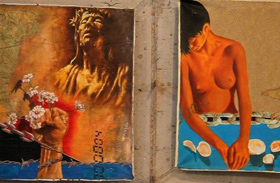Kim Ki-duk, one of South Korea’s premiere – and most prolific – arthouse filmmakers for the last two decades, has, with his new film Arirang, assembled a diary that helps to explain why we haven’t seen any new projects from him since 2008’s Dream. Turning the camera on himself for 100 insufferable minutes, this is the kind of narcissistic woe-is-me claptrap that gives the Video Diary genre an unnecessarily bad name (e.g. Tarnation, Alain Cavalier’s oeuvre, and even Panahi’s newest, This is Not a Film, to name a few). If it had to exist for the sake of Kim getting back on track to make more quality films, the least he and his distributors could have done is resign it as a DVD-extra curio – though, even then, most would turn it off after about five minutes.
While filming Dream, one of Kim’s actresses had a near-death experience, an event that, he thinks, drove him into the reclusive state in which he currently resides. This event is taken to be the ‘reason’ for Kim’s directorial silence, yet his focus with this project is not to detail the virtually paternal sense of responsibility he has toward his actors, but the psychological necessity he feels for churning out masterpieces on a regular basis. Can’t shoot a new film? Why not build an espresso machine, or a gun? This latter activity might have at least elicited a hint of drama in a fictional film, but, sans any headlines having announced the death of a leading Korean auteur, it sits statically as just another heavy-handed symbolic gesture.
When he isn’t showing the primordial means of existence he’s taken upon himself, Kim takes to long-winded monologues in which he touts his directorial methods, as if we should benefit from his ‘director’s block’ as some sort of readymade masterclass. Late in the film, he shows us a scene from one of his films, this time the climatic moment of his Spring, Summer, Fall, Winter…and Spring. When he bursts into tears – after early scenes of hammering in his filmmaking philosophies – we don’t so much have the sense that he is grieving the loss of his practice, as we do that he is advertising his ability to craft emotionally manipulative sequences in his films. It’s obviously a therapeutic exercise meant to self-motivate, but, as a work that audiences will be expected to shell out money to see, it all seems exceedingly self-serving.
Tech credits are not only low, but frequently viscerally grating. Kim employs a consumer-grade camcorder to film his musings, but never experiments with the material, such as the aesthetic blotchiness that Caouette emplyed in Tarnation, nor the Brechtian austerity that so enhanced Panahi’s constrained project. Music is also minimal, save for Kim’s repeated recitations of the titular Korean folk song. ‘Butcher-job’ doesn’t quite adequately describe his cover, as he pierces the audiences ears with, presumably, a comparable agony as that contained within his weary soul. The song is considered an unofficial national anthem for Korea, the meaning of which is indiscernible. Kim may very well escape this relatively extended hiatus, and he may even attribute his salvation to this film. While such an outcome would be a sufficient raison d’être for him making Arirang, it would not nearly justify why anyone other than him should have seen it.
Reviewed on May 14th at the 2011 Cannes Film Festival – Un Certain Regard section
Runtime: 100 Mins
